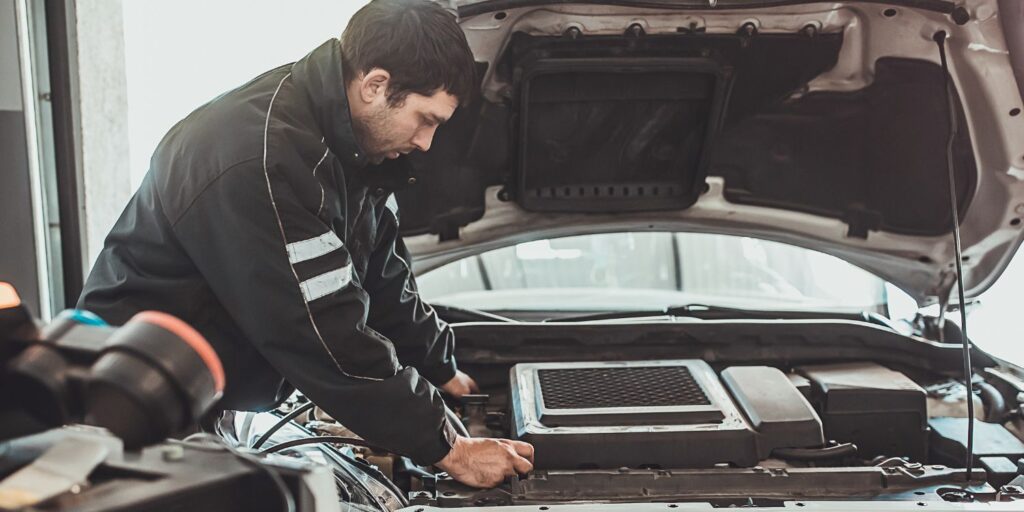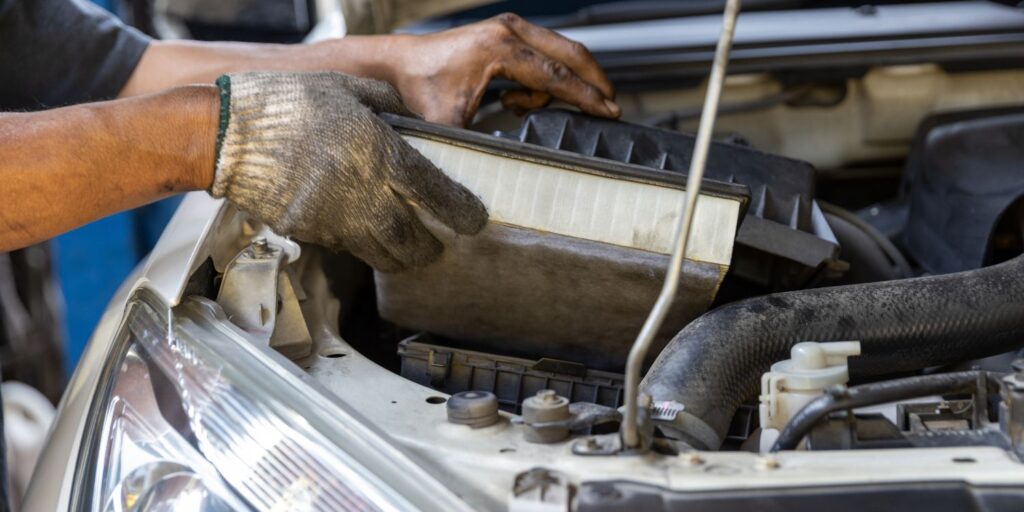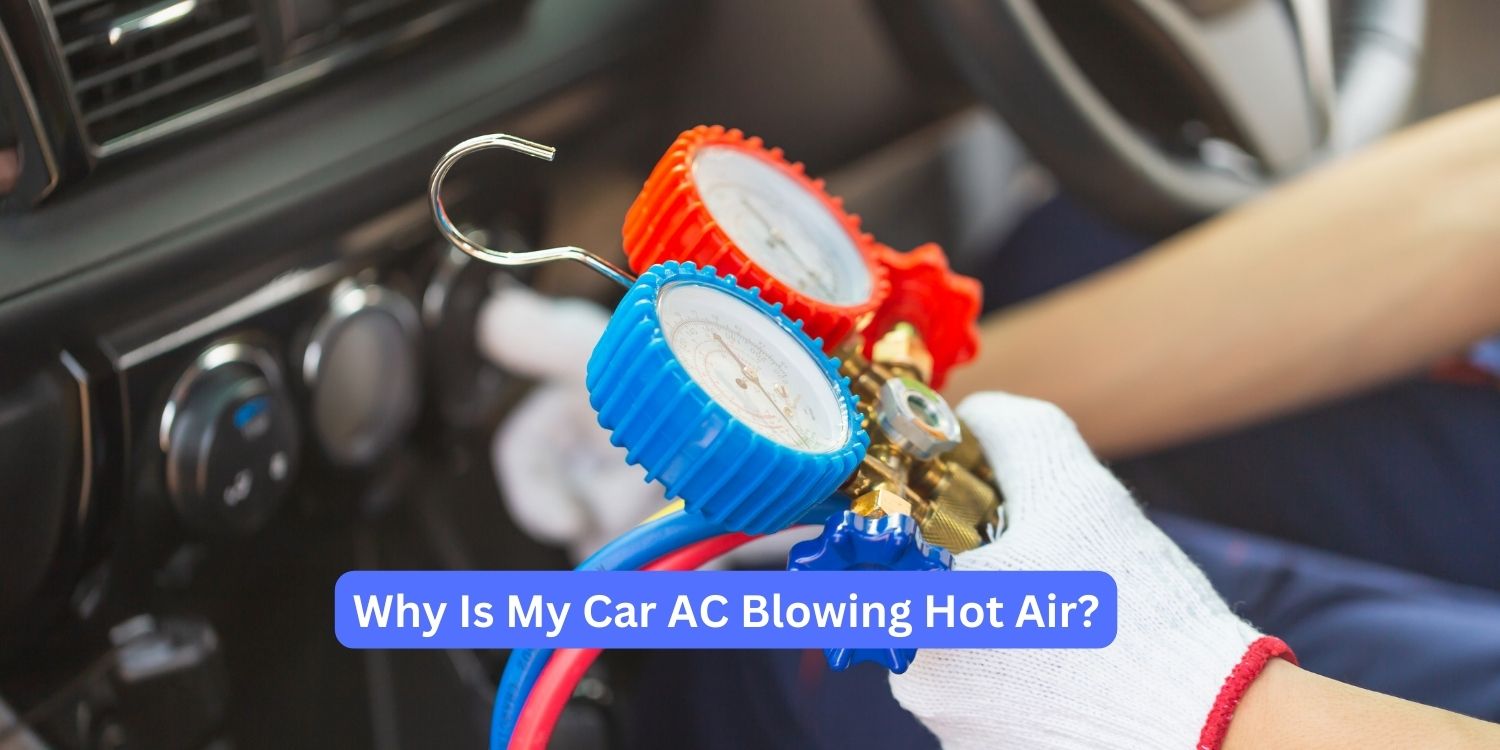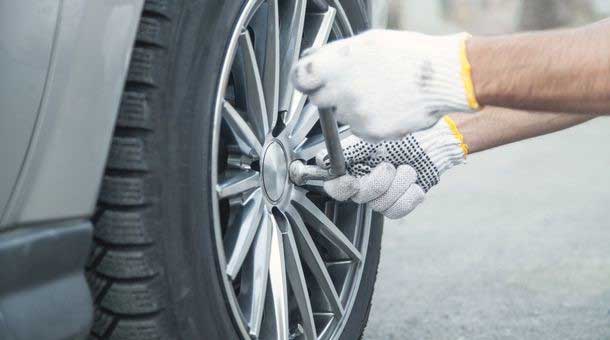Driving in the summer heat without AC can quickly make your commute uncomfortable. If your vehicle’s air conditioning system is blasting hot air instead of cooling things down, it can ruin your journey.
Understanding the potential causes and solutions for this issue is key to staying comfortable and safe on the road.
When temperatures soar, you rely on your car’s AC to keep the cabin cool and pleasant. But it becomes a real problem when it pumps out hot air. We’ll explore some common reasons why this happens, and how to get it fixed.
Learn more about Knowing What Econ Means in Your Car?
Common Reasons for Car AC Blowing Hot Air
Let’s Discuss them
Low Refrigerant Level
Low refrigerant levels are among the leading causes of hot air from your car’s AC. The refrigerant absorbs heat from the cabin air, cools it, and recirculates it back inside the vehicle.
When your car’s refrigerant level is low, this process can be interrupted causing warm air to blow out from the vents.
Faulty Compressor
The compressor is the heart of your car’s AC system and is responsible for pressurizing and circulating refrigerant. If the compressor fails or malfunctions, it can lead to hot air blowing from the AC.
Common issues with the compressor include leaks, clutch failure, or mechanical breakdown.

Blocked Air Filters
Air filters that are dirty or clogged may limit airflow into the AC system thereby reducing cooling efficiency. Over time, dust particles accumulate, and debris obstructs cold air from flowing into the cabin.
Therefore, one must frequently clean or replace these filters to alleviate this problem.
Electrical Issues
Electrical problems such as faulty relays, fuses, or wiring can disrupt the functioning of your car’s AC system.
If certain electrical components fail or malfunction, it can prevent the AC compressor from engaging, resulting in hot air blowing from the vents.
Leaking Refrigerant
Refrigerant leaks are another common cause of hot air blowing from the car’s AC. Over time, the AC system may develop leaks due to worn-out seals, hoses, or components.
A refrigerant leak not only affects the cooling performance of the AC but can also damage other system components.
DIY Troubleshooting Steps
If your car’s AC is blowing hot air, you can perform DIY troubleshooting steps to identify and possibly resolve the issue before seeking professional help.
Check Refrigerant Levels
Check the refrigerant levels in your car’s AC system using a pressure gauge or refrigerant leak detector. If the level is low, you may need to recharge the system with refrigerant.
However, follow manufacturer guidelines and safety precautions when handling refrigerant.
Inspect Compressor
Inspect the AC compressor for any signs of damage, leaks, or abnormal sounds. If you notice any issues, such as oil spots or unusual noises coming from the compressor, it may need to be repaired or replaced by a qualified technician.
Clean or Replace Air Filters
Remove and inspect the air filters for dirt, debris, or clogs. If the filters are dirty or clogged, clean them using compressed air or replace them with new ones according to the manufacturer’s recommendations.

Check Electrical Connections
Inspect the electrical connections, relays, and fuses associated with the AC system for any signs of damage or corrosion. Tighten loose connections and replace faulty relays or fuses to ensure proper electrical supply to the AC components.
Look for Refrigerant Leaks
Carefully inspect the AC system, including hoses, fittings, and components, for any signs of refrigerant leaks. Use a UV dye or refrigerant leak detector to identify leaks, and repair or replace damaged components as necessary.
When to Seek Professional Help
DIY steps not working? Feeling unsure about complex repairs? It’s wise to get professional help. Certified mechanics and HVAC techs have special knowledge, proper tools, and loads of experience.
They can find and fix tricky AC problems efficiently. Don’t risk making things worse, call the experts.
Read More About How to Keep Your Car Cool When the Car AC Is Not Working.
Tips for Preventing Hot Air from AC
To prevent your car’s AC from blowing hot air in the future, consider implementing the following preventive maintenance tips:
- Regularly inspect and maintain your car’s AC system, including refrigerant levels, compressor, and air filters.
- Keep your car parked in shaded areas whenever possible to reduce the load on the AC system.
- Avoid running the AC at full blast immediately after starting the engine; instead, gradually increase the fan speed to allow the system to cool down gradually.
- Schedule periodic AC system inspections and maintenance with a qualified technician to catch and address potential issues early on.
FAQS
How often should I recharge my car’s AC system refrigerant?
The frequency of refrigerant recharge depends on various factors, including the car’s age, usage patterns, and existing leaks.
It’s recommended to consult your vehicle’s manual or a qualified technician for specific guidelines.
Can I use DIY AC recharge kits available in auto parts stores?
While DIY AC recharge kits are available, they may not always provide a long-term solution to refrigerant leaks or other AC issues.
It’s best to consult a professional technician for proper diagnosis and repair.
Is it normal for the AC to emit a musty odor?
A musty odor from the AC vents could indicate the presence of mold or mildew in the system.
It’s essential to have the AC system inspected and cleaned to eliminate any potential health hazards and improve air quality.
What should I do if my car’s AC blows cold air intermittently?
Intermittent cooling issues could be due to various factors, including electrical problems, compressor issues, or refrigerant leaks.
It’s advisable to have the AC system inspected by a qualified technician to identify and address the underlying cause.
Can I drive my car with a malfunctioning AC compressor?
While it’s technically possible to drive with a malfunctioning AC compressor, it’s not recommended.
A faulty compressor can further damage the AC system and compromise driving comfort. It’s best to have the issue addressed promptly by a professional technician.
How can I tell if my car’s AC compressor is faulty?
Signs include unusual noises, oil spots, or insufficient cooling. Consult a technician for inspection if you notice these symptoms.
Why does my car’s AC system emit a buzzing or humming noise?
A buzzing or humming noise from the AC system could indicate issues with electrical components such as relays, switches, or the compressor.
These issues may disrupt the proper functioning of the AC system, leading to hot air blowing from the vents. Consulting a professional technician for diagnosis and repair is recommended in such cases.
How can I prevent refrigerant leaks in my car’s AC system?
Regular maintenance and inspections prevent leaks. Ensure seals, hoses, and fittings are in good condition.
What are the dangers of driving with low refrigerant levels in my car’s AC system?
Low refrigerant strains the compressor, causing potential damage and discomfort. Address promptly to prevent further issues.
Can extreme temperatures affect my car’s AC performance?
Extreme temperatures can affect AC performance. Proper insulation and shading and regular maintenance help mitigate these effects.
Conclusion
Experiencing hot air blowing from your car’s AC can be frustrating, especially during hot summer days.
By understanding the common reasons behind this issue and following the troubleshooting steps outlined in this article, you can diagnose and address the problem effectively.
Remember to prioritize regular maintenance and seek professional help to ensure your car’s AC system remains in optimal condition.




